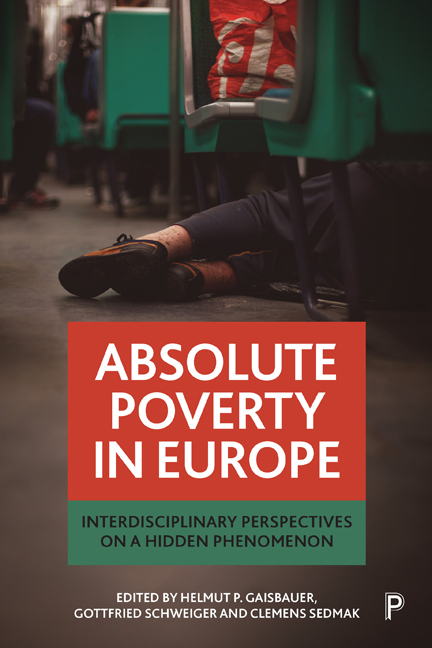Book contents
- Frontmatter
- Contents
- List of figures and tables
- Notes on contributors
- 1 Absolute poverty in Europe: introduction
- Part One Conceptual and methodological challenges
- Part Two Key issues for the absolute poor
- Part Three Policy responses to absolute poverty in Europe
- Part Four Ethical perspectives on absolute poverty in Europe
- Conclusion responding to the dark reality of absolute poverty in European welfare states
- Index
18 - Justice and absolute poverty
Published online by Cambridge University Press: 27 April 2022
- Frontmatter
- Contents
- List of figures and tables
- Notes on contributors
- 1 Absolute poverty in Europe: introduction
- Part One Conceptual and methodological challenges
- Part Two Key issues for the absolute poor
- Part Three Policy responses to absolute poverty in Europe
- Part Four Ethical perspectives on absolute poverty in Europe
- Conclusion responding to the dark reality of absolute poverty in European welfare states
- Index
Summary
Introduction
This chapter examines absolute poverty in Europe as a problem of justice. It begins by outlining some of the meta-theoretical issues that are involved in this task. First, I use what can be called a middle-ground approach: : I apply a theoretical and multidimensional concept of justice to the social problem of absolute poverty in Europe and further specify the principles of this theoretical concept as necessary. The theoretical framework of justice that I outline and apply has a general scope but I focus on those aspects which I deem important for the task at hand. Thus I do not aim to sufficiently justify all aspects of my theoretical concept of justice. Secondly, my approach can be called non-ideal (Valentini, 2012). This means that I do not craft highly abstract principles of justice but assume that we need to try to come up with theoretical insights that can help us in the real world. Often theories of justice make idealised assumptions about the agents of justice and the context in which they are acting. In contrast, I suppose that reality puts important constraints on what we can achieve and how justice can be realised, in particular for the disadvantaged. Thirdly, such an ethical evaluation of absolute poverty in Europe faces several limitations. On the one hand it has to deal with empirical evidence, which is complex and often not straightforward. It is necessary to make some assumptions about the nature and social context of absolute poverty and those who live under these conditions, and many of these assumptions can hardly be generalised for the whole population of the absolute poor or the different contexts in which they live. On the other hand, my analysis is limited in its depth and scope because I am only able to draw general conclusions, for example about how the justice-based entitlements of the absolute poor can be protected. To devise or analyse concrete policies is thus not the subject here.
Dimensions of justice
I want to distinguish three dimensions of justice, which are separated but also interwoven. The first one can best be described as the entitlement of each and every person to sufficient recognition.
- Type
- Chapter
- Information
- Absolute Poverty in EuropeInterdisciplinary Perspectives on a Hidden Phenomenon, pp. 383 - 396Publisher: Bristol University PressPrint publication year: 2019



